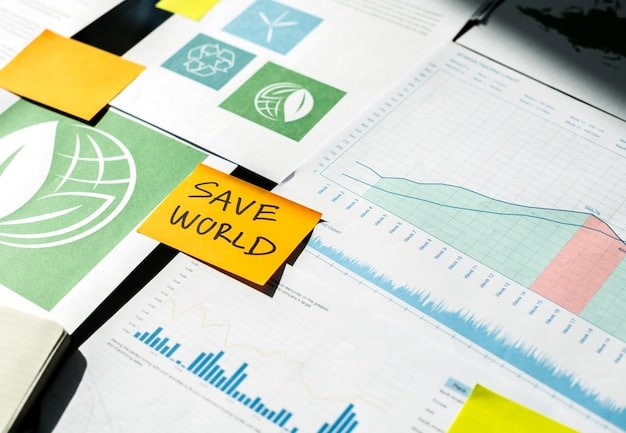WEF’s SDGs: Impact on US Corporate Social Responsibility

The World Economic Forum’s (WEF) recommendations on Sustainable Development Goals (SDGs) are poised to significantly influence US Corporate Social Responsibility (CSR) initiatives by driving greater accountability, standardization, and integration of environmental, social, and governance (ESG) factors into corporate strategies.
The global landscape of corporate responsibility is constantly evolving. The impending impact of the World Economic Forum’s (WEF) recommendations on Sustainable Development Goals (SDGs) is set to redefine how US corporations approach their Corporate Social Responsibility (CSR) initiatives.
Understanding the World Economic Forum and Sustainable Development Goals
The World Economic Forum (WEF) is an international organization committed to improving the state of the world. By engaging leaders across society, it shapes global, regional, and industry agendas. The Sustainable Development Goals (SDGs), established by the United Nations, are a collection of 17 interlinked global goals designed to be a blueprint to achieve a better and more sustainable future for all.
Understanding the WEF and SDGs is crucial as these entities set the tone for global sustainability efforts, influencing policy and corporate behavior worldwide.
The Role of the World Economic Forum
The WEF acts as a catalyst for discussions and partnerships aimed at addressing global challenges. Its annual meeting in Davos brings together political, business, and academic leaders to collaborate on these issues. The WEF provides a platform for developing innovative solutions and promoting best practices in various sectors, including sustainability.
Decoding the Sustainable Development Goals
The SDGs cover a broad range of topics, from poverty eradication and quality education to climate action and gender equality. Each goal has specific targets to be achieved by 2030, providing a framework for governments, organizations, and individuals to contribute to sustainable development. For companies, aligning with the SDGs can offer a strategic direction for CSR initiatives.
- Goal 1: No Poverty
- Goal 4: Quality Education
- Goal 5: Gender Equality
- Goal 13: Climate Action
In summary, the World Economic Forum is an entity that brings together world leaders to discuss pressing issues. The SDGs outlined by the UN offer frameworks for governments and organizations to follow for a more sustainable future.
The Current State of CSR Initiatives in the US
US corporations have increasingly embraced CSR, driven by consumer demand, investor pressure, and regulatory requirements. CSR initiatives in the US range from environmental sustainability and ethical sourcing to community engagement and diversity and inclusion programs. However, the effectiveness and standardization of these initiatives vary significantly.
Understanding the current state of CSR in the US provides a baseline for assessing the potential impact of the WEF’s SDG recommendations.
Diverse Approaches to CSR
US companies adopt diverse approaches to CSR, reflecting different priorities and stakeholder expectations. Some focus on reducing their environmental footprint, while others prioritize social issues such as poverty alleviation or promoting human rights. This diversity can lead to a lack of consistency and comparability in CSR reporting and performance.
Reporting and Transparency Challenges
While many US companies produce CSR reports, the quality and transparency of these reports vary greatly. There is a lack of standardized metrics and frameworks for measuring and reporting on CSR performance, making it difficult for stakeholders to assess and compare companies’ social and environmental impact. This lack of transparency can undermine the credibility of CSR initiatives.

Many US companies do not produce CSR reports, leading to an overall lack of transparency that creates difficulty when measuring CSR performance.
Ultimately, CSR is a growing space for US corporations and it is something that more and more consumers expect of the companies they are purchasing from.
How WEF’s SDG Recommendations Can Influence US CSR
The WEF’s SDG recommendations offer a framework for aligning US CSR initiatives with global sustainability goals. These recommendations can drive greater standardization, accountability, and impact measurement in US CSR, leading to more effective and meaningful corporate contributions to sustainable development.
By adopting the WEF’s SDG recommendations, US companies can enhance their CSR strategies and create positive social and environmental outcomes.
Standardization and Benchmarking
The WEF promotes standardized metrics and frameworks for measuring and reporting on SDG-related performance. By adopting these standards, US companies can improve the comparability and transparency of their CSR reports, allowing stakeholders to benchmark their performance against industry peers and global best practices. This standardization can drive greater accountability and continuous improvement in CSR performance.
Integrating SDGs into Corporate Strategy
The WEF encourages companies to integrate the SDGs into their core business strategies, rather than treating CSR as a separate or add-on activity. By aligning their business goals with the SDGs, US companies can create shared value for shareholders and society, driving innovation and long-term sustainable growth. This integration can lead to more impactful and transformative CSR initiatives.
- Aligning business goals with SDGs
- Creating shared value for shareholders and society
- Driving innovation for long-term sustainable growth
The standardization and benchmarking provided by the WEF can lead to US companies developing better CSR initiatives.
Potential Challenges and Opportunities for US Corporations
While adopting the WEF’s SDG recommendations offers significant benefits, US corporations may face challenges such as resistance to change, resource constraints, and conflicting stakeholder priorities. However, these challenges also present opportunities for innovation, collaboration, and leadership in sustainable development.
Navigating these challenges and opportunities effectively is essential for US companies to realize the full potential of SDG-aligned CSR.
Overcoming Resistance to Change
Implementing SDG-aligned CSR may require significant changes to corporate culture, processes, and decision-making. Overcoming resistance to change requires strong leadership commitment, effective communication, and employee engagement. US companies can learn from early adopters and best practices to facilitate a smooth transition to SDG-aligned CSR.
Resource Constraints and Investment
Implementing SDG-aligned CSR may require significant investments in new technologies, processes, and training. US companies may face resource constraints, particularly small and medium-sized enterprises (SMEs). However, sustainable investments can generate long-term cost savings, revenue opportunities, and competitive advantages, justifying the initial investment.

Fostering Collaboration
Finally, by working together with other corporations and leaders, implementing SDG-aligned CSR will allow for innovation to foster and spread around the world. With increased collaboration and focus on the SDGs, greater action can be taken towards a more sustainable planet.
Although there are challenges and opportunities for US companies to face, these issues will only serve to benefit the world as US corporations embrace the WEF’s SDG recommendations.
Examples of Companies Aligning with WEF’s SDG Recommendations
Several companies, both globally and in the US, have already started implementing WEF’s SDG recommendations in their operations. These companies have already begun setting an example for how other corporations can take strides to do the same. Analyzing these companies is vital to further understanding the WEF’s SDG recommendations and the effects they can have on CSR.
Looking at a few case studies of companies can display the effectiveness of WEF’s SDG recommendations.
Unilever
Unilever has been a strong advocate for sustainable business practices, aligning its business strategy with the SDGs. The company has set ambitious targets for reducing its environmental footprint and improving the livelihoods of millions of people in its supply chain. Unilever’s Sustainable Living Plan integrates sustainability into its core business operations, driving innovation and long-term growth.
Patagonia
Patagonia is renowned for its commitment to environmental sustainability and social responsibility. The company donates a percentage of its sales to environmental causes and actively advocates for policies that protect the planet. Patagonia’s mission is to “build the best product, cause no unnecessary harm, use business to inspire and implement solutions to the environmental crisis.”
Danone
Danone is committed to creating economic and social value.” The company has also been working to reduce carbon emissions into the atmosphere as well. The company aims to have transparent information about its goals and sustainability objectives.
Reviewing other companies and their actions regarding the WEF’s SDG recommendations can help provide insight into how US operations can become more corporately responsible.
The Future of US CSR in the Context of Global Sustainability
The integration of WEF’s SDG recommendations into US CSR initiatives signals a transformative shift towards a more comprehensive and impactful approach to corporate responsibility. As businesses face increasing pressure to contribute positively to society and the environment, aligning with global sustainability goals becomes not just a moral imperative but a strategic necessity.
With these global sustainability goals in mind, US CSR is bound to look different in the future.
Evolving Expectations
Consumers, investors, and regulators are increasingly demanding greater accountability and transparency from companies regarding their social and environmental impact. US corporations must adapt to these evolving expectations by embracing more robust and SDG-aligned CSR strategies. This shift will require a fundamental rethinking of corporate purpose and a commitment to creating shared value for all stakeholders.
Technological Innovations
Technological innovations such as artificial intelligence, blockchain, and data analytics can play a crucial role in advancing SDG-aligned CSR. These technologies can enable companies to track and measure their social and environmental impact more accurately, improve supply chain transparency, and engage stakeholders more effectively. US corporations can leverage these technologies to drive greater efficiency and impact in their CSR initiatives.
- Artificial intelligence
- Blockchain
- Data analytics
As more and more companies start integrating WEF’s SDG recommendations into their operations, US operations will adapt and make their own CSR greater than it is now.
| Key Aspect | Brief Description |
|---|---|
| 🌍 Global Impact | WEF’s SDGs drive US CSR towards globally recognized sustainability goals. |
| 📊 Standardization | Common metrics for CSR reporting, improving transparency and comparability. |
| 🤝 Collaboration | Encourages partnerships between companies, governments, and NGOs, creating social and sustainable progress. |
| 🌱 Future Growth | Sustainable investments drive efficiency, innovation, and profit. |
FAQ
▼
The Sustainable Development Goals (SDGs) are a collection of 17 global goals set by the United Nations, covering a wide range of social, economic, and environmental issues. These goals act as blueprints to attaining sustainability and a better future for all people.
▼
The World Economic Forum (WEF) promotes the SDGs by engaging leaders from business, government, and civil society to collaborate on solutions to global challenges. WEF initiatives aim to educate corporations on the SDG, as well as encourage best practices.
▼
US companies should align with the SDGs to improve their CSR initiatives, meet stakeholder expectations, contribute to global sustainability, and unlock new market opportunities. By achieving more sustainable operations, corporations can benefit from increased brand recognition.
▼
Potential challenges for US companies in adopting SDG recommendations include resistance to change, resource constraints, and conflicting stakeholder priorities. Because of these challenges, corporations may not have access to the tools needed for change.
▼
Technology can help US companies achieve the SDGs by providing tools for monitoring and measuring their impact, improving supply chain transparency, and enabling stakeholder engagement and collaboration. Technology offers the data needed to achieve sustainability.
Conclusion
In conclusion, the World Economic Forum’s recommendations on Sustainable Development Goals are set to have a big impact on US Corporate Social Responsibility initiatives. By embracing these sustainable goals and best practices into their operations, corporations can foster a better planet and a better image for themselves.





